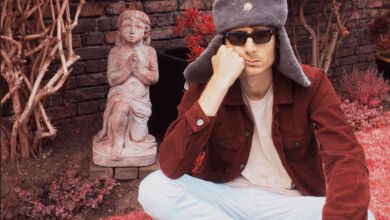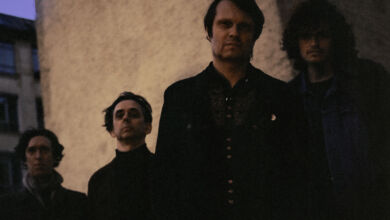
“England’s dancing days are done”
Songs of conflict, songs of harm, songs bereft of coquettish charm… otherworldly songs of the impending death that ultimately befalls all who attempt to impose their will on unwilling subjects… that PJ Harvey is being lined up by the Imperial War Museum’s head of collections, Roger Tolson, for possible future assignments in conflict zones where the British Army is engaged, in a war-songs composer capacity, should come as little or no surprise. On the strength on her eighth studio album, ‘Let England Shake’, she is the right woman for the job.
Interviewed by John Wilson recently on Radio 4’s Front Row on the very subject, Polly Jean confirmed: “I would (have) relish(ed) that… I find myself more and more yearning to do work like that, even if there is no such appointment, to just go out there anyway”. However absurd the proposition may at first seem on paper, it has already garnered support from Jeremy Dellar, 2004 Turner Prize sculptor, who’s striking work, 5 March 2007, was created from the wreck of a car blown to hell and back on the streets of Baghdad, and caused shock and awe when exhibited at the Imperial War Museum in September 2010. Tolson is apparently committed to putting Harvey’s name forward to the museum’s committee for due consideration: “I know this makes it sound very bureaucratic, but there are other ways too. Some of our most interesting work is not committee-led – for example, our work with Jeremy Deller” (Thorpe, 2011).
If the gravitas already being afforded ‘Let England Shake’ in some quarters is indicative of what lies within, then… its touting as a future Mercury Prize winner surely cannot be dismissed as premature? Whatever transpires, Miss Harvey’s bid to become the aural equivalent of a Goya, a Nash, a Moore, a Howson, a McQueen or a McCullin, should be respected and revered in equal measure, not only for taking issue with the wounded-soldier-stance, as a concept, but for bringing a female perspective to an ever-growing list of male names.
Not by accident did Harvey elect to debut the album’s title track on the Andrew Marr Show, in front of one of the architects-in-chief of the current, arrogant, Afghan war: Gordon Brown. The conceit of the Blair administration in estimating that they could succeed where the might of the Russian army had failed, is the absolute conceit of a small island nation that has, for some misguided reason, long believed that the rest of the world is not fit to lick it’s highly polished boots… or, conversely, only fit to lick its highly polished boots!
Composed in the aforementioned mindset of ‘official war song correspondent’, and recorded in a Dorset church with usual suspects, John Parish, Mick Harvey, and Jean-Marc Butty, ‘Let England Shake’ has been expertly engineered by Rob Kirwin, and atmospherically mixed by Flood, with assistance from Catherine Marks and John Catlin. The overall sound is crafted from a folk-rock base, honed by auto harps, trombones, saxophones, xylophones, mellotrons, Rhodes, pianos, organs, and, in (dark) places (‘In The Dark Places’, ‘Bitter Branches’), the kind of guitars we associate with Harvey’s classic nigh-on-twenty-year-old debut, ‘Dry’. Running to a full length of 40:16, the albums’s twelve compositions barely have time to outstay their welcome, before it is time to press ‘play’ once again. In these end days of the overlong, the indulgent, the much wrought, and the expansive, Polly’s clarity, brevity, strength and depth, of both sound and vision, therefore, win her great accolades in this writer’s humble opinion.
Opening with the album’s titular movement, ‘Let England Shake’ starts as it means to go on… pregnant with allegory, defiant in cause: ‘weighted down by silent dead’. Discordant elements mingle willingly to fashion a sound that is as old as it is inherently new: the waves Britannia once ruled are ebbing, Polly rides a new wave, a career-defining epoch that promises everything, and denies nothing… Afghanistan, Gallipoli, Iraq, Egypt, Tunisia… Iran? ‘The Last Living Rose’ matches the evocative cinematography of its attendant video with aplomb, a marvellous ditty, replete with wonky sax break, that opens thus: “Goddam Europeans!/Take me back to England/& the grey damp filthiness of ages/fog rolling down behind the mountains/& on the graveyards, and dead sea-captains”.
‘The Glorious Land’ features a wobbly, sampled hunting horn, that hints at the ineffectuality of the Hunting Ban, taunting the classes that flaunt it, with its accusations of the kind of orphan-creation theorism that only a faith-based perspective sadly lacking in faith in human nature, obsessed by profit, ignorant of prophets, can actually espouse. The stunning first single from the LP, ‘The Words That Maketh Murder’, culminates with the ironic subversion of Eddie Cochran’s 1958 number, ‘Summertime Blues’: “What if I take my problem to the United Nations”, to haunting effect.
‘On Battleship Hill’ opens on a typically PJ-esque riff, briefly descending into operatic flurry, before evolving into more traditional fayre, as Parish and Harvey’s male voices vie for microphone space, and a lush quagmire of intricate piano-led melody dresses proceedings in gossamer finery: “Cruel nature has won again”, cries Polly, succumbing to the futile inevitability of it all. ‘England’ begins with shards of Arabic melody, shrapnel of middle-eastern instrumentation on a acoustic guitar bed, summoning images of a fatally wounded Tommy, bleeding his heart out over the desert sands, assured that he will never see his beloved Blighty again.
The aforementioned ‘In The Dark Places’ has become one of my favourite ever PJ Harvey songs, these past few days, learning to live with ‘Let England Shake’, like a widow learns to live with the losses of war… it’s majestic riffage, it’s darkened hue, the blackened, tanned images of the horrific acts men commit under the guise of ‘I was only following orders’. Mist-shrouded forests, shallow graves, the secrets soldiers subsequently carry to their own eventual graves, through their future civilian lives of post-traumatic stress disorder, redundancy and guilt. ‘Bitter Branches’, too, looks backwards, in terms of sonic form… reverse echo, forward reverberation… a subtle rebirth, a grand reinvention: “Wave goodbye, wave goodbye!”
The album’s pivotal climax comes in the form of ‘Written On The Forehead’, the track that initially turned my head to the promise of ‘Let England Shake’, just two-short months ago. Ingeniously utilising a sample from Niney The Observer’s ‘Blood & Fire’, the song is possibly the bravest statement Polly Jean Harvey has ever made, both musically, and subjectively: “A sad circus beside a trench of burning oil”, not only serves as a fitting epitaph for the Iraq war, but acts as a prophetic presage to the forthcoming war with Iran… coming to a petrol station forecourt near you … any day now, any day now, it will be realised.
Long time confident, and now sadly departed friend, Captain Beefheart, would surely have approved of this one, as should you… as should every peace-loving humanist on this God-forsaken planet. Blast it from the minarets, rock it from the casbah, drown out the strains of ‘Jerusalem’ . . . no countenance divine shines forth from these clouded hills.
Reference: Thorpe, V – ‘Songs Of Conflict’ – The Observer, Manchester (11/02/11)
Simon Morgan © – February 2011: wastebin@trakmarx.com
Originally posted 2011-02-28 20:21:19. Republished by Blog Post Promoter








